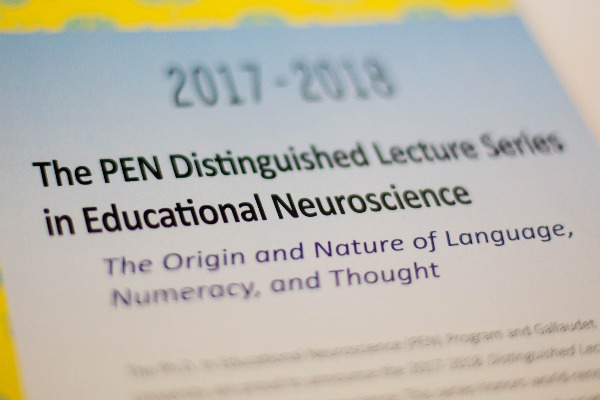PEN Distinguished Lecture Series
The PEN Distinguished Lecture Series in Educational Neuroscience was created in association with the Foundations Proseminar course for graduate students in the Ph.D. in Educational Neuroscience (PEN) program. Since its inception, the series has grown!
The lecture series focuses on the intersection of the Science of Learning (learning across the lifespan) and Educational Neuroscience (learning across early life). Scientists and researchers who are pioneers in the fields of Cognitive-Educational Neuroscience, Developmental Cognitive Neuroscience, and Child Development come to Gallaudet University's campus to talk about their research.
Register for Upcoming Lectures
All lectures are open to the public and are video recorded for online distribution.
PEN DLS brochure for 2024-2025
Amodal neurolinguistic and cognitive representations: Evidence from prosody and number concepts in ASL signers and English speakers
Presentation Abstract
In the last few decades many studies have demonstrated striking parallels between signed and spoken languages in terms of their grammatical structure, acquisition, processing, and neural underpinnings.
Dr. Coppola's presentation focuses on two domains that have not been previously studied in both modalities: prosodic processing and number cognition.
The Closure Positive Shift (CPS) is an established ERP component observed in response to processing prosodic phrase boundaries, which signal the internal structure of the message. In spoken languages, the CPS has been elicited by sound-based correlates of prosodic phrasing, such as slower speech before a boundary, or shorter or longer pauses between phrases. Is sound necessary for this type of linguistic processing? Using novel, carefully controlled stimuli in ASL and spoken English, Coppola's team observed a CPS at comparable phrase boundaries in both Deaf native American Sign Language (ASL) signers and hearing native English speakers. These results challenge the claim that the CPS depends on sound, and suggests similarity in prosodic processing across signed and spoken languages.
The second part of the talk addresses number cognition. Deaf children learning ASL from their Deaf parents from birth show the same developmental trajectory as do hearing children who learn spoken English from their hearing parents from birth (Early Language groups). However, on average, deaf children who begin acquiring ASL or spoken English at some point after birth (Later Language groups) perform more poorly. These findings may in part explain the significant “math gap” long observed between deaf children and their hearing peers.
Thus, the timing of language exposure is important for the development of age-appropriate number concepts, but the modality of language is not. These results, taken together, contribute novel developmental and neurolinguistic evidence to the growing body of knowledge regarding language modality, sensitive periods, and neural plasticity
Biography
While working in Dr. Steven Pinker’s laboratory at MIT, Dr. Coppola met doctoral student Ann Senghas, who was embarking on her documentation of Nicaraguan Sign Language (NSL), which had begun emerging about 15 years earlier. Dr. Coppola earned her PhD with Drs. Elissa Newport and Ted Supalla at the University of Rochester, and then worked with Dr. Susan Goldin-Meadow at the University of Chicago.
With colleagues, Dr. Coppola pioneered the field of emerging languages, which offers insights into the human capacity for language, effects of language modality, sensitive periods, and the impact of variable language experiences on cognitive development. Since 1994, Dr. Coppola has conducted fieldwork in Nicaragua, and worked closely with a small number of homesigners -- deaf adults who have not had access to a sign language or a Deaf community. She has discovered that despite this lack of linguistic input, homesigners innovate a number of linguistic properties in their gesture systems. However, the negative consequences of such language deprivation can be observed in other domains; this work led her to study the impact of language experience on number concepts and social cognition in deaf children in the United States.
Currently, Dr. Coppola is Associate Professor in the Departments of Psychological Sciences and Linguistics at the University of Connecticut, where she directs the Language Creation Laboratory and the NSF-funded Study of Language and Math (slam.uconn.edu).
Dr. Coppola’s experience as the daughter of Deaf parents makes her research possible and motivates her national and international advocacy work (her father, Richie, recently celebrated his 50th reunion at Gallaudet). She founded Manos Unidas (Hands Together, manos-unidas.org), a non-profit organization that is developing a smartphone app to increase literacy among Nicaraguan deaf children and their families (allchildrenreading.org).
